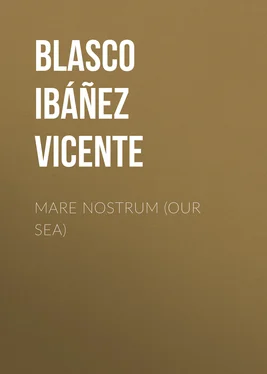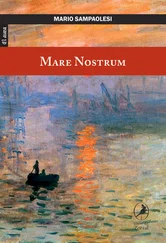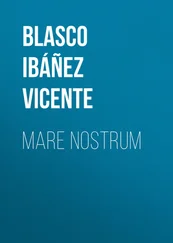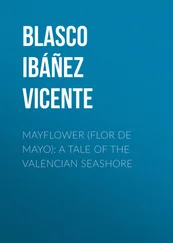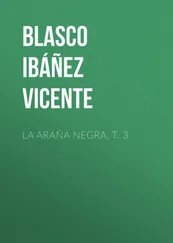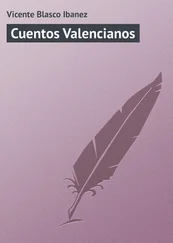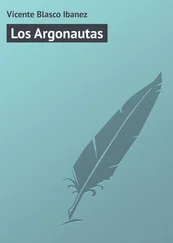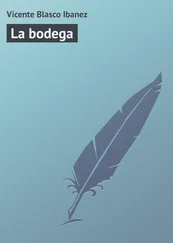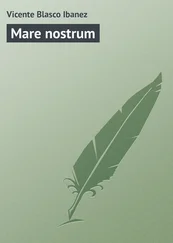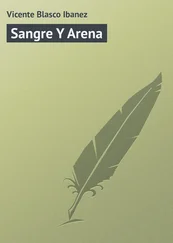Vicente Blasco Ibáñez - Mare Nostrum (Our Sea)
Здесь есть возможность читать онлайн «Vicente Blasco Ibáñez - Mare Nostrum (Our Sea)» — ознакомительный отрывок электронной книги совершенно бесплатно, а после прочтения отрывка купить полную версию. В некоторых случаях можно слушать аудио, скачать через торрент в формате fb2 и присутствует краткое содержание. Жанр: foreign_prose, foreign_antique, на английском языке. Описание произведения, (предисловие) а так же отзывы посетителей доступны на портале библиотеки ЛибКат.
- Название:Mare Nostrum (Our Sea)
- Автор:
- Жанр:
- Год:неизвестен
- ISBN:нет данных
- Рейтинг книги:5 / 5. Голосов: 1
-
Избранное:Добавить в избранное
- Отзывы:
-
Ваша оценка:
- 100
- 1
- 2
- 3
- 4
- 5
Mare Nostrum (Our Sea): краткое содержание, описание и аннотация
Предлагаем к чтению аннотацию, описание, краткое содержание или предисловие (зависит от того, что написал сам автор книги «Mare Nostrum (Our Sea)»). Если вы не нашли необходимую информацию о книге — напишите в комментариях, мы постараемся отыскать её.
Mare Nostrum (Our Sea) — читать онлайн ознакомительный отрывок
Ниже представлен текст книги, разбитый по страницам. Система сохранения места последней прочитанной страницы, позволяет с удобством читать онлайн бесплатно книгу «Mare Nostrum (Our Sea)», без необходимости каждый раз заново искать на чём Вы остановились. Поставьте закладку, и сможете в любой момент перейти на страницу, на которой закончили чтение.
Интервал:
Закладка:
Over the town, lined up along the Marinela, the churches of Naples reared their domes and towers with glazed roofs, green and yellow, which appeared more like pinnacles of Oriental baths than the roofs of Christian temples.
The barefooted lazzarone with his red cap no longer existed, but the crowd,—clad like the workmen of all ports—still gathered around the daubed poster that represented a crime, a miracle or a prodigious specific, listening in silence to the harangue of the narrator or charlatan. The old popular comedians were declaiming with heroic gesticulations the epic octavos of Tasso, and harps and violins were sounding accompaniments to the latest melody that Naples had made fashionable throughout the entire world. The stands of the oyster-men constantly sent forth an organic perfume from the spent wave, and all around them empty shells scattered their disks of pearly lime over the mud.
Near to the ancient Captaincy of the port, the palace of Charles III,—blue and white, with an image of the immaculate conception,—were assembled the unloading trucks, whose teams still preserved their ancient hybrid originality. In some instances the shafts were occupied by a white ox, sleek with enormous and widely branching horns, an animal similar to those that used to figure in the religious ceremonies of the ancients. At his right would be hooked a horse, at his left, a great raw-boned mule, and this triple and discordant team appeared in all the carts, standing immovable before the ships the length of the docks, or dragging their heavy wheels up the slopes leading to the upper city.
In a few days the captain grew tired of Naples and its bustle. In the cafés of the Street of Toledo and the Gallery of Humbert I, he had to defend himself from some noisy youths with low-cut vests, butterfly neckties and little felt hats perched upon their manes, who, in low voices, proposed to him unheard-of spectacles organized for the diversion of foreigners.
He had also seen enough of the paintings and domestic objects excavated from the ancient cities. The lewdness of the secret cabinets finally irritated him. It appeared to him the reverse of recreation to contemplate so many childish fantasies of sculpture and painting having the antique symbol of masculinity as its principal motif.
One morning he boarded a train and, after skirting the smoking mountain of Vesuvius, passing between rose-colored villages surrounded with vineyards, he stopped at the station of Pompeii.
From the funereal solitudes of hotels and restaurants, the guides came forth like a suddenly awakened swarm of wasps, lamenting that the war had cut off the tourist trade. Perhaps he would be the only one who would come that day. " Signor , at your service, at any price whatever!…" But the sailor continued on alone. Always, in recalling Pompeii, he had wished to see it again alone, absolutely alone, so as to get a more direct impression of the ancient life.
His first view of it had been seventeen years ago when, as a mate of a Catalan sailing vessel anchored in the port of Naples, he had taken advantage of the cheapness of Sunday rates and had seen everything as one of a crowd that was pushing and treading on everybody's feet so as to listen to the nearest guide.
At the head of the expedition had been a priest, young and elegant, a Roman Monsignor , clad in silk, and with him two showy foreign women, who were always climbing up in the highest places, raising their skirts rather high for fear of the star lizards that were writhing in and out of the ruins. Ferragut, in humble admiration, always remained below, glimpsing the country from behind their legs. "Ay! Twenty-two years!…" Afterwards when he heard Pompeii spoken of, it always evoked in his memory several strata of images. "Very beautiful! Very interesting!" And in his mind's eye he saw again the palaces and temples, but as a secondary consideration, like a shrouded background, while in the forefront were four magnificent legs standing forth,—a human colonnade of slender shafts swathed in transparent black silk.
The solitude so long desired for his second visit was now aggressively in evidence. In this deserted, dead city there were to-day no other sounds than the whirring of insect wings over the plants beginning to clothe themselves with springtime verdure, and the invisible scampering of reptiles under the layers of ivy.
At the gate of Herculaneum, the guardian of the little museum left Ferragut to examine in peace the excavations of the various corpses, petrified Pompeiians of plaster still in the attitudes of terror in which death had surprised them. He did not abandon his post in order to trouble the captain with his explanations; he scarcely raised his eyes from the newspaper that he had before him. The news from Rome,—the intrigues of the German diplomats, the possibility that Italy might enter the war,—were absorbing his entire attention.
Afterwards on the solitary streets the sailor found everywhere the same preoccupation. His footsteps resounded in the sunlight as though treading the depths of the hollow tombs. The moment he stopped, silence again enveloped him,—"A silence of two thousand years," thought Ferragut to himself, and in the midst of this primeval silence sounded far-away voices in the violence of a sharp discussion. They were the guardians and the employees of the excavations who, lacking work, were gesticulating and insulting each other in these strongholds twenty centuries old so profoundly isolated from patriotic enthusiasm or fear of the horrors of war.
Ferragut, map in hand, passed among these groups without annoyance from insistent guides. For two hours he fancied himself an inhabitant of ancient Pompeii who had remained alone in the city on a holiday devoted to the rural divinities. His glance could reach to the very end of the straight streets without encountering persons or things recalling modern times.
Pompeii appeared to him smaller than ever in this solitude,—an intersection of narrow roads with high sidewalks paved with polygonal blocks of blue lava. In its interstices Spring was forming green grass plots dotted with flowers. Carriages,—of whose owners not even the dust was left,—had with their deep wheels opened up ridges in the pavement more than a thousand years ago. In every crossway was a public fountain with a grotesque mask which had spouted water through its mouth.
Certain red letters on the walls were announcements of elections to be held in the beginning of that era,—candidates for aedile or duumvir who were recommended to the Pompeiian voters. Some doors showed above, the phallus for conjuring the evil eyes; others, a pair of serpents intertwined, emblem of family life. In the corners of the alleyways, a Latin verse engraved on the walls asked the passerby to observe the laws of sanitation, and there still could be seen on the stuccoed walls caricatures and scribbling, handiwork of the little street gamins of Caesar's day.
The houses were lightly constructed upon floors cracked by minor earthquakes before the arrival of the final catastrophe. The lower floors were of bricks or concrete and the others, of wood, had been devoured by the volcanic fire, only the stairways remaining.
In this gracious city of amiable and easy-going life, more Greek than Roman, all the lower floors of the plebeian houses had been occupied by petty traders. They were shops with doors the same size as the establishment, four-sided caves like the Arabian zocos whose furthermost corners were visible to the buyer stopping in the street. Many still had their stone counters and their large earthen jars for the sale of wine and oil. The private dwellings had no facades, and their outer walls were smooth and unapproachable, but with an interior court providing the surrounding chambers with light as in the palaces of the Orient. The doors were merely half-doors of escape, parts of larger ones. All life was concentrated around the interior, the central patio, rich and magnificent, adorned with fish ponds, statues and flower-bordered beds.
Читать дальшеИнтервал:
Закладка:
Похожие книги на «Mare Nostrum (Our Sea)»
Представляем Вашему вниманию похожие книги на «Mare Nostrum (Our Sea)» списком для выбора. Мы отобрали схожую по названию и смыслу литературу в надежде предоставить читателям больше вариантов отыскать новые, интересные, ещё непрочитанные произведения.
Обсуждение, отзывы о книге «Mare Nostrum (Our Sea)» и просто собственные мнения читателей. Оставьте ваши комментарии, напишите, что Вы думаете о произведении, его смысле или главных героях. Укажите что конкретно понравилось, а что нет, и почему Вы так считаете.
